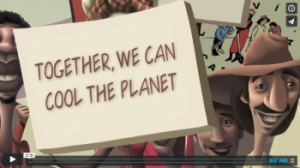WORKSHOP
WORLD FOOD DAYS AT NEW COLLEGE, UNIVERSITY OF TORONTO
Wed Oct 15, Thurs Oct 16 and Fri Oct 17
At New College, U of T, we’re celebrating World Food Day with 3 days of special events! Join us for great speakers, workshops and FOOD on the theme of “Agroecology: The Next New Thing in Food?” Everyone welcome!
Presented by the New College Initiatives Fund, the Principal’s Innovation Fund, Equity Studies, New One, Caribbean Studies, the New College Office of Residence and Student Life and the Toronto Food Policy Council.
For details, contact Lori Stahlbrand lori.stahlbrand@gmail.com
WEBINAR
Addressing Food Insecurity in Children: Lessons from Brazil
Nutrition Resource Centre Kids in Focus Webinar Series
Tuesday October 21, 2014
10:30 am – 11:30 am EDT
Brazil has been receiving international recognition for its ground-breaking and progressive FOME ZERO (ie. Zero Hunger) strategy for food security. In this webinar, join Dr. Cecilia Rocha, Director of the School of Nutrition at Ryerson University, as she draws important insights from Brazil’s experience for improving children food security and health in Ontario. Read more…
WEBINAR
Tuesday, October 21, 2014 12:00 pm EDT
The Good Food Organizations program offers a way for community-based food security organizations across Canada to work towards a healthy and fair food system through a shared set of “Good Food Principles”. Join Community Food Centres Canada for a 45-60 minute interactive orientation on our new initiative, Good Food Organizations. Register…
PUBLIC LECTURE
Tuesday, 21 October 2014 at 7pm
Guelph Public Library, 100 Norfolk St.
Dr.Ben White
Professor Emeritus, International Institute of Social Studies,
Erasmus University, The Netherlands
Register…
WEBINAR
WEDNESDAY, OCTOBER 22, 3:00 – 4:30 p.m. EDT
In Ontario, several institutions are already producing food on their properties as a way to generate revenue; supply nutritious fresh food for consumption (by staff, patients, students, etc.); provide skills training and therapeutic benefits; and build social enterprises. This webinar will share how project partners at health care, social service and educational institutions went about getting gardens off the ground at their institutions, as well as some of the lessons we learned in the first year of working with pilot projects across the province. Read more…
PUBLIC LECTURE
“Empathetic Innovations for Inclusive Development: Can we learn from Grassroots Innovators?”
Tuesday, Oct. 28th, from 5:30-7:00pm in RM 1800 in the Pathobiology Bldg. University of Guelph
Dr. Anil K. Gupta is professor in the Centre for Management in Agriculture, Indian Institute of Management, and coordinator of the Society for Research and Initiatives for Sustainable Technologies and Institutions. Open to the public. Free admission. Please direct any enquiries to Abeir el Arqusosi at a.arqusosi@exec.uoguelph.ca
CONFERENCE
Join the Halton Food Council to hear from a panel of farmers, policymakers, community groups, and grocers as they share their stories about the opportunities and challenges to build a more resilient local food system.
Thursday, November 6th, 2014
8:00 a.m. – 1:00 p.m.
A local breakfast and lunch will be served. For more information contact haltonfoodcouncil@gmail.com or call 647-830-0328. Space is limited.
Register at http://haltonfoodsummit.eventbrite.ca
CONFERENCE
November 7th, 8th, 9th, 2014
MacDonald Campus of McGill University, Sainte-Anne-de-Bellevue, Quebec
Building on the incredible success of their 2012 conference, The Eastern Canadian Organic Seed Growers’ Network (ECOSGN) is partnering with The Bauta Family Initiative on Canadian Seed Security and Seeds of Diversity Canada this year to host their second major ecological seed conference for Eastern Canada.
ECOSGN’s “Seed Connections” conference is a fully bilingual event bringing together farmers, seed-savers, seed companies, community gardeners, researchers, and experts on organic seed production to share knowledge, skills, and experience over a packed, 3-day agenda! Whether you are a beginner gardener or an expert seed producer, if you are interested in ecological seed in eastern Canada – this is the conference to attend!
Read more…
CONFERENCE
Food Secure Canada has announced the full programme for its bi-annual assembly, Waves of Change: Sustainable Food for All, which will take place at the Halifax Habourfront Hotel from November 13th to 16th.
With more than sixty workshops, plenaries, and working groups, these three days of action-packed learning by Canada’s food movement will provide an unique opportunity to tackle a broad range of food issues and to create effective, collective responses to current challenges of sustainability, hunger and health. Read more…
CONFERENCE
November 24-25, 2014
Kingston Four Points Sheraton
The 2014 Eastern Ontario Local Food Conference is our region’s annual conference bringing together all aspects of our local food system. This event gives you the opportunity to:
• Get a “bird’s eye view” of what’s happening in local food throughout eastern Ontario;
• Make key connections with businesses and organizations that can support your work;
• Attend sessions that address current challenges in Eastern Ontario’s local food sector;
• Enjoy and celebrate eastern Ontario’s local food offerings with others who are as passionate about local food as you are. Read more…

 This new COOL market is built on a new open source platform called “
This new COOL market is built on a new open source platform called “
